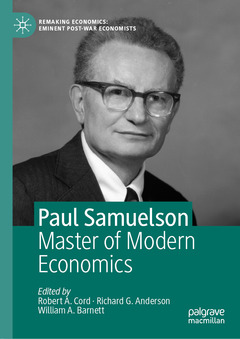Paul Samuelson, 1st ed. 2019 Master of Modern Economics Remaking Economics: Eminent Post-War Economists Series
Coordonnateurs : Cord Robert A., Anderson Richard G., Barnett William A.

1. Introduction- Richard G. Anderson.-
Part I. Samuelson’s Contribution to Economics: Methodology and Mathematics
2. Paul Samuelson’s Ideology and Scientific Economics- J. Daniel Hammond
3. Re-Examining Samuelson’s Operationalist Methodology- D. Wade Hands
4. The Young Paul Samuelson: Mathematics as a Language, the Operational Attitude, and Systems in Equilibrium- Juan Carvajalino
5. Paul Samuelson and My Intellectual Development- Gregory C. Chow
6. Some Correspondence with Paul Samuelson on Economic Theory: An Intimate Memoir- Donald A. Walker
7. Some Correspondence with Paul Samuelson on the History of Economic Thought: An Intimate Memoir- Donald A. Walker
8. The Samuelson Revolution in Australia- Alex Millmow
Part II. Samuelson’s Contribution to Economics: Microeconomics and Finance
9. Samuelson’s Approach to Revealed Preference Theory: Some Recent Advances- Thomas Demuynck and Per Hjertstrand
10. Paul Samuelson and the Economics of Pass-Through and the Envelope Theorem- Joseph Farrell
11. Not a Behaviorist: Samuelson’s Contributions to Utility Theory in the Harvard Years, 1936-1940- Ivan Moscati12. A Short History of the Bergson-Samuelson Social Welfare Function- Herrade Igersheim
13. Climbing Mount Everest: Paul Samuelson on Financial Theory and Practice- Jeremy J. Siegel
14. Paul Samuelson: Three Key Contributions to Finance- Ronald MacDonald
Part III. Samuelson’s Contribution to Economics: Macroeconomics, International Trade and Development
15. Paul Samuelson and Macroeconomics- K. Vela Vellupillai
16. Keynesian Uncertainty: The Great Divide between Joan Robinson and Paul Samuelson in their Correspondence and Public Exchanges- Harvey Gram with the collaboration of G.C. Harcourt
17. Paul Samuelson, Government, and Monetary Policy: Some Evidence from the Archives- Robert A. Cord
18. Paul A. Samuelson and the Foundation of International Economics- Lall Ramrattan and Michael Szenberg19. Samuelson’s Contributions to Population Theory and Overlapping Generations in Economics- Ronald Lee
20. Paul Samuelson’s Contributions to Public Economics- Michael J. Boskin
21. Samuelson on Ricardo and on Technical Change- Arnold Heertje
22. Divergence and Convergence: Paul Samuelson on Economic Development- Mauro Boianovsky
Offers a fresh take on Samuelson's work and influence.
Features contributions from authors who knew Samuelson previously.
Focuses on how Samuelson's work has been developed by others.
Date de parution : 01-2020
Ouvrage de 594 p.
14.8x21 cm
Disponible chez l'éditeur (délai d'approvisionnement : 15 jours).
Prix indicatif 315,45 €
Ajouter au panierThème de Paul Samuelson :
Mots-clés :
Keynesian Economics; monetarists; Chicago School of Economics; Neoclassical economics; Nobel Memorial Prize for Economics 1970; Neoclassical synthesis; National Medal of Science in 1996; Revealed preference theory; Utility theory; Paul Samuelson; Demand theory for households and firms; Welfare economics; Growth theory; Game theory; Stochastic process theory; Mathematical biology



